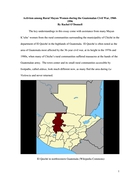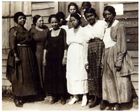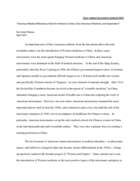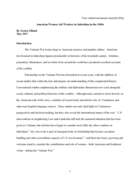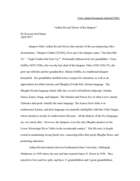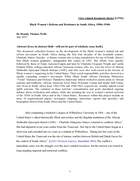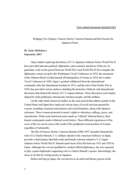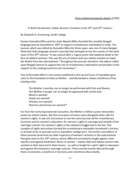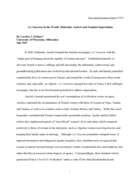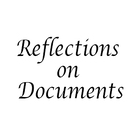Browse Scholarly Essays - 73 results
Activism among Rural Mayan Women during the Guatemalan Civil War, 1960-1996
written by Rachel O'Donnell, fl. 2003 (Alexandria, VA: Alexander Street, 2016), 17 page(s)
This essay focuses on the activism of rural Mayan women who participated in the insurgency during the Guatemalan civil war and have done community development work after the war.
Sample
written by Rachel O'Donnell, fl. 2003 (Alexandria, VA: Alexander Street, 2016), 17 page(s)
Description
This essay focuses on the activism of rural Mayan women who participated in the insurgency during the Guatemalan civil war and have done community development work after the war.
Collection
Women and Social Movements, Modern Empires Since 1820
Field of Study
Women and Social Movements
Content Type
Essay
Author / Creator
Rachel O'Donnell, fl. 2003
Date Published / Released
2016
Publisher
Alexander Street
Topic / Theme
Guatemalan Civil War, 1960-1996, Indigenous Women, Women and Development, Social and Political Leadership, Social Movements and Indigenous Women, Agriculture, K'iche', Mayan, Guatemalans, 20th Century in World History (1914--2000)
Copyright Message
Copyright @ 2016 by Alexander Street Press
×
**Addie Waits Hunton: Social Justice and Human Rights Activist
written by Adrienne Lash Jones, fl. 1993 (Alexandria, VA: Alexander Street, 2015), 8 page(s)
Open Access
written by Adrienne Lash Jones, fl. 1993 (Alexandria, VA: Alexander Street, 2015), 8 page(s)
Collection
Women and Social Movements in the United States,1600-2000
Field of Study
Women and Social Movements
Content Type
Essay, Reflections on Documents
Author / Creator
Adrienne Lash Jones, fl. 1993
Date Published / Released
2015
Publisher
Alexander Street
Person Discussed
Addie Waits Hunton, 1866-1943
Topic / Theme
Suffragists, Associations and organizations, Civil rights
×
American Medical Missionary Work for Women in China, Sino-American Relations, and Imperialism
written by Connie Shemo, fl. 2009 (Alexandria, VA: Alexander Street, 2017), 26 page(s)
In constructing this document cluster, we have sought to provide sources to help scholars and students explore the many facets of American missionary involvement in introducing a new system of medical care to China in all their complexities. The collection includes writings from American women missionary physicia...
Sample
written by Connie Shemo, fl. 2009 (Alexandria, VA: Alexander Street, 2017), 26 page(s)
Description
In constructing this document cluster, we have sought to provide sources to help scholars and students explore the many facets of American missionary involvement in introducing a new system of medical care to China in all their complexities. The collection includes writings from American women missionary physicians, American women nurses, and Chinese women physicians and nurses who had been educated in mission institutions. Also included are wr...
In constructing this document cluster, we have sought to provide sources to help scholars and students explore the many facets of American missionary involvement in introducing a new system of medical care to China in all their complexities. The collection includes writings from American women missionary physicians, American women nurses, and Chinese women physicians and nurses who had been educated in mission institutions. Also included are writings from Chinese women in debates about the health of Chinese women, giving insight into subjects such as Chinese views on birth control and the practice of “breast binding” which have rarely been treated by English-language scholars. The collection ranges from the 1890s to the end of the 1940s, with later reminiscences that range into the 1980s. This essay is intended to provide historical context for the documents and to point out some ways that we see change over time through the documents. In particular, we can see, as the twentieth century progressed, a growing struggle among both American and Chinese writers with issues of race, imperialism, and nationalism in providing health care to Chinese women.
Show more
Show less
Collection
Women and Social Movements, Modern Empires Since 1820
Field of Study
Women and Social Movements
Content Type
Essay
Author / Creator
Connie Shemo, fl. 2009
Date Published / Released
2017
Publisher
Alexander Street
Topic / Theme
Women and Education, Women and Sexuality, Birth Control, and Health, Women and Religion, Women, Colonization, Empire, and Post Coloniality, Empire and Education, Women as Medical Professionals, Indigenous Women and Missionaries, Opposition to Imperialism, Nationalism and Independence Movements, Access to Higher Education, Americans, Chinese, 20th Century in World History (1914--2000), Industrializ...
Women and Education, Women and Sexuality, Birth Control, and Health, Women and Religion, Women, Colonization, Empire, and Post Coloniality, Empire and Education, Women as Medical Professionals, Indigenous Women and Missionaries, Opposition to Imperialism, Nationalism and Independence Movements, Access to Higher Education, Americans, Chinese, 20th Century in World History (1914--2000), Industrialization and Western Global Hegemony (1750–1914)
Show more
Show less
Copyright Message
Copyright @ 2017 by Alexander Street
×
American Women Aid Workers in Indochina in the 1960s
written by Jessica Elkind, fl. 2005 (Alexandria, VA: Alexander Street, 2017), 20 page(s)
Although U.S. political and military efforts in Indochina ended in failure, the civilian aid workers’ record is more complicated. As the documents included in this cluster suggest, women volunteers’ time in Southeast Asia had a profound and often positive effect on their lives as well as those of some people...
Sample
written by Jessica Elkind, fl. 2005 (Alexandria, VA: Alexander Street, 2017), 20 page(s)
Description
Although U.S. political and military efforts in Indochina ended in failure, the civilian aid workers’ record is more complicated. As the documents included in this cluster suggest, women volunteers’ time in Southeast Asia had a profound and often positive effect on their lives as well as those of some people in their host country. Some of these women maintained relationships with people they had met or taught in Vietnam. Some of the progra...
Although U.S. political and military efforts in Indochina ended in failure, the civilian aid workers’ record is more complicated. As the documents included in this cluster suggest, women volunteers’ time in Southeast Asia had a profound and often positive effect on their lives as well as those of some people in their host country. Some of these women maintained relationships with people they had met or taught in Vietnam. Some of the programs the American women introduced continued after their departure. Although they have largely been erased from official histories of U.S. involvement in Indochina, women aid workers played an important role and their experiences deserve to be shared.
Show more
Show less
Collection
Women and Social Movements, Modern Empires Since 1820
Field of Study
Women and Social Movements
Content Type
Essay
Author / Creator
Jessica Elkind, fl. 2005
Date Published / Released
2017
Publisher
Alexander Street
Topic / Theme
Vietnam War, 1956-1975, Women, Colonization, Empire, and Post Coloniality, Women and Development, Nationalism and Independence Movements, Opposition to Imperialism, Support for Imperialism, Economic Development, Laotians, Vietnamese, 20th Century in World History (1914--2000)
Copyright Message
Copyright @ 2017 by Alexander Street
×
Ardina Revard Moore of the Quapaw
written by Rowena McClinton, 1940- (Alexandria, VA: Alexander Street, 2017), 14 page(s)
Quapaw Elder Ardina Revard Moore (the narrator of the accompanying video documentary, “Quapaw Culture”) lives up to her Quapaw name, "Ma-shru-Ghi-Ta" – “Eagle Feather that Gets Up." Profoundly influenced by her grandfather, Victor Griffin (1873-1958), who was the last chief of the Quapaw Tribe (1929-1956...
Open Access
written by Rowena McClinton, 1940- (Alexandria, VA: Alexander Street, 2017), 14 page(s)
Description
Quapaw Elder Ardina Revard Moore (the narrator of the accompanying video documentary, “Quapaw Culture”) lives up to her Quapaw name, "Ma-shru-Ghi-Ta" – “Eagle Feather that Gets Up." Profoundly influenced by her grandfather, Victor Griffin (1873-1958), who was the last chief of the Quapaw Tribe (1929-1956-57), she grew up with him and her grandmother, Minnie Griffin, in a traditional Quapaw household. Her grandfather instilled in her a...
Quapaw Elder Ardina Revard Moore (the narrator of the accompanying video documentary, “Quapaw Culture”) lives up to her Quapaw name, "Ma-shru-Ghi-Ta" – “Eagle Feather that Gets Up." Profoundly influenced by her grandfather, Victor Griffin (1873-1958), who was the last chief of the Quapaw Tribe (1929-1956-57), she grew up with him and her grandmother, Minnie Griffin, in a traditional Quapaw household. Her grandfather instilled in her a respect for education, as well as an appreciation for tribal customs and Dhegiha (O-Gah-Pah) Siouan language. The Dhegiha Siouan language family falls into several well-defined subgroups: Omaha, Ponca, Kansa, Osage, and Quapaw. The Omahas and Poncas live in what is now eastern Nebraska and speak virtually the same language. The Kansa (Kaw) tribe is in northeastern Kansas, and their language was mutually intelligible with that of the Osages, whose domain is mostly in southwestern Missouri. All the dialects of the five languages are very much alike. However, the Quapaws were the only Dhegiha speakers in the Lower Mississippi River Valley in the seventeenth century. Her life story is deeply rooted in maintaining strong family ties, connecting tribes that speak Dhegiha Sioux, and promoting education.
Show more
Show less
Collection
Women and Social Movements, Modern Empires Since 1820
Field of Study
Women and Social Movements
Content Type
Essay
Author / Creator
Rowena McClinton, 1940-
Date Published / Released
2017
Publisher
Alexander Street
Person Discussed
Ardina Moore, 1930-
Topic / Theme
Indigenous Women, Women and Education, Political and Human Rights, Social and Political Leadership, Indigenous Languages, Social and Cultural Rights, Quapaw, 20th Century in World History (1914--2000)
Copyright Message
Copyright @ 2017 by Alexander Street
×
Black Women's Reform and Resistance in South Africa, 1900s-1940s
written by Brandy Thomas Wells, fl. 2016 (Alexandria, VA: Alexander Street, 2017), 21 page(s)
This document collection focuses on the development of the Black women’s mutual aid and reform movement in South Africa during the first four decades of the twentieth century. Charlotte Manye Maxeke—a Basuto woman who is long considered to be one of South Africa’s first Black women graduates—inaugurated th...
Sample
written by Brandy Thomas Wells, fl. 2016 (Alexandria, VA: Alexander Street, 2017), 21 page(s)
Description
This document collection focuses on the development of the Black women’s mutual aid and reform movement in South Africa during the first four decades of the twentieth century. Charlotte Manye Maxeke—a Basuto woman who is long considered to be one of South Africa’s first Black women graduates—inaugurated this course in 1901. Her efforts were quickly followed by those of Fanny Jackson-Coppin and later by Charlotte Crogman Wright and Luella...
This document collection focuses on the development of the Black women’s mutual aid and reform movement in South Africa during the first four decades of the twentieth century. Charlotte Manye Maxeke—a Basuto woman who is long considered to be one of South Africa’s first Black women graduates—inaugurated this course in 1901. Her efforts were quickly followed by those of Fanny Jackson-Coppin and later by Charlotte Crogman Wright and Luella Graham White, college-educated African American women, who, too, were the wives of African Methodist Episcopal Church bishops (AME), and who were also well-versed in the lessons of Black women’s organizing in the United States. Their social responsibility activities showed in a rapidly expanding women’s movement. While Black South African Christians Sibusisiwe “Violet” Makanya and Florence Thandiswa Makiwane Jabavu worked to ensure pride in African customs and traditions, African American wives Susie Wiseman Yergan and Madie Hall Xuma, who lived in South Africa from 1922-1936 and 1940-1963, respectively, steadily upheld social uplift activism. The variation in these activists’ concentration and goals elucidated ongoing debates about civilization and culture, while also pointing the way to women’s protest activism of the 1950s in South Africa and in the United States. Resources within this project include an array of organizational papers, newspaper clippings, missionary reports and speeches, and biographies drawn from South Africa and the United States.
Show more
Show less
Collection
Women and Social Movements, Modern Empires Since 1820
Field of Study
Women and Social Movements
Content Type
Essay
Author / Creator
Brandy Thomas Wells, fl. 2016
Date Published / Released
2017
Publisher
Alexander Street
Person Discussed
Madie Hall Xuma, 1894-1982, Mrs. Max Yergan, fl. 1933, Florence Thandiswa Jabavu, 1895-, Violet Sibusisiwe Makanya, 1894-, Luella Graham White, fl. 1937, Charlotte Crogman Wright, fl. 1955, Fanny Jackson Coppin, 1837-1913, Charlotte Manye, 1874-1939
Topic / Theme
Women of Color, Women and Education, Women and Religion, Race Discrimination, Women as Teachers, Indigenous Women and Missionaries, Women Missionaries, African Americans, South Africans, 20th Century in World History (1914--2000), Industrialization and Western Global Hegemony (1750–1914)
Copyright Message
Copyright @ 2017 by Alexander Street
×
Bridging Two Empires: Frances Hawks Cameron Burnett and Her Passion for Japanese Poetry
written by Taeko Shibahara, fl. 2010 (Alexandria, VA, 2017, originally published 2017), 9 page(s)
The life of Frances Hawks Cameron Burnett (1884-1957, hereafter Burnett) the wife of Lt Charles Burnett, U.S. military attaché to the American Embassy in Japan, provides a third picture that links male and female activism related to U.S.-Japan relations before World War II. Burnett spent most of her life between...
Sample
written by Taeko Shibahara, fl. 2010 (Alexandria, VA, 2017, originally published 2017), 9 page(s)
Description
The life of Frances Hawks Cameron Burnett (1884-1957, hereafter Burnett) the wife of Lt Charles Burnett, U.S. military attaché to the American Embassy in Japan, provides a third picture that links male and female activism related to U.S.-Japan relations before World War II. Burnett spent most of her life between 1911 and 1929 in Japan. Although she was not qualified to conduct official diplomacy, she was expected to play a quasi-diplomatic suppo...
The life of Frances Hawks Cameron Burnett (1884-1957, hereafter Burnett) the wife of Lt Charles Burnett, U.S. military attaché to the American Embassy in Japan, provides a third picture that links male and female activism related to U.S.-Japan relations before World War II. Burnett spent most of her life between 1911 and 1929 in Japan. Although she was not qualified to conduct official diplomacy, she was expected to play a quasi-diplomatic supporting role as Charles Burnett’s spouse. Interestingly, she chose to do this by writing poetry in Japanese.
Show more
Show less
Collection
Women and Social Movements, Modern Empires Since 1820
Field of Study
Women and Social Movements
Content Type
Essay
Author / Creator
Taeko Shibahara, fl. 2010
Date Published / Released
2017, October 2017
Person Discussed
Frances Hawks Cameron Burnett, 1884-1957
Copyright Message
Copyright @ 2017 by Alexander Street
×
A Brief Introduction: Indian Women's Activism in the 19th and 20th Century
written by Elisabeth Armstrong, fl. 2016 (Alexandria, VA: Alexander Street, 2017), 23 page(s)
From its inception, the Indian women’s movement had three overlapping strands: leftist feminism, social reform feminism and nationalist feminism. These three strands are often portrayed as historical phases of the Indian women’s movement. In fact, throughout the 20th century these strands have nourished and c...
Sample
written by Elisabeth Armstrong, fl. 2016 (Alexandria, VA: Alexander Street, 2017), 23 page(s)
Description
From its inception, the Indian women’s movement had three overlapping strands: leftist feminism, social reform feminism and nationalist feminism. These three strands are often portrayed as historical phases of the Indian women’s movement. In fact, throughout the 20th century these strands have nourished and clashed with each other in generative ways.
Collection
Women and Social Movements, Modern Empires Since 1820
Field of Study
Women and Social Movements
Content Type
Essay
Author / Creator
Elisabeth Armstrong, fl. 2016
Date Published / Released
November 2017, 2017
Publisher
Alexander Street
Topic / Theme
Women, Colonization, Empire, and Post Coloniality, Work and Class Identity, Empire and Feminism, Class Discrimination, Nationalism and Independence Movements, Indians (Asian), Adivasi, 20th Century in World History (1914--2000), Industrialization and Western Global Hegemony (1750–1914)
Copyright Message
Copyright @ 2017 by Alexander Street
×
La Citoyenne in the World: Hubertine Auclert and Feminist Imperialism
written by Carolyn Eichner, fl. 2004 (Alexandria, VA: Alexander Street, 2017), 22 page(s)
Sample
written by Carolyn Eichner, fl. 2004 (Alexandria, VA: Alexander Street, 2017), 22 page(s)
Collection
Women and Social Movements, Modern Empires Since 1820
Field of Study
Women and Social Movements
Content Type
Essay
Author / Creator
Carolyn Eichner, fl. 2004
Date Published / Released
2017
Publisher
Alexander Street
Person Discussed
Hubertine Auclert, 1848-1914
Topic / Theme
Political and Human Rights, Women, Colonization, Empire, and Post Coloniality, Women of Color, Suffrage, Empire and Feminism, Race Discrimination, Support for Imperialism, Kabyle, Arabs, French, Industrialization and Western Global Hegemony (1750–1914)
Copyright Message
Copyright @ 2017 by Alexander Street
×
**"Connections between State Commissions on the Status of Women and Modern Feminism," chap. 5 in Living with History/Making Social Change
written by Gerda Lerner, 1920-2013 (Chapel Hill, NC: University of North Carolina Press, 2009)
Open Access
written by Gerda Lerner, 1920-2013 (Chapel Hill, NC: University of North Carolina Press, 2009)
Collection
Women and Social Movements in the United States,1600-2000
Field of Study
Women and Social Movements
Content Type
Essay, Reflections on Documents
Author / Creator
Gerda Lerner, 1920-2013
Date Published / Released
2009
Publisher
University of North Carolina Press
Person Discussed
Kathryn Dorothy Frederick Clarenbach, 1920-1994
Topic / Theme
Biographies, Oral history, Labor unions, History, Women's rights, Stereotypes, The Sixties (1960–1974), Late 20th Century (1975–2000), 20th Century in World History (1914--2000)
×

